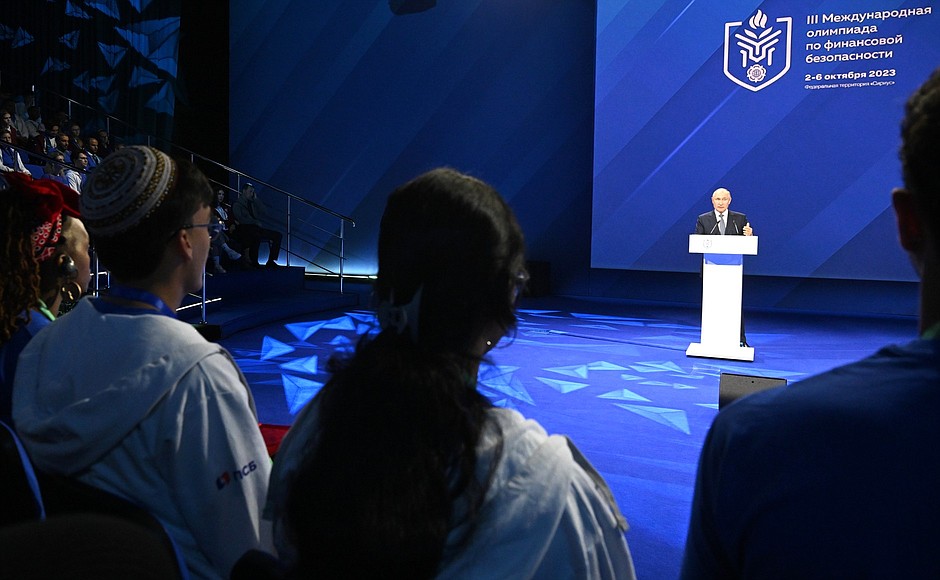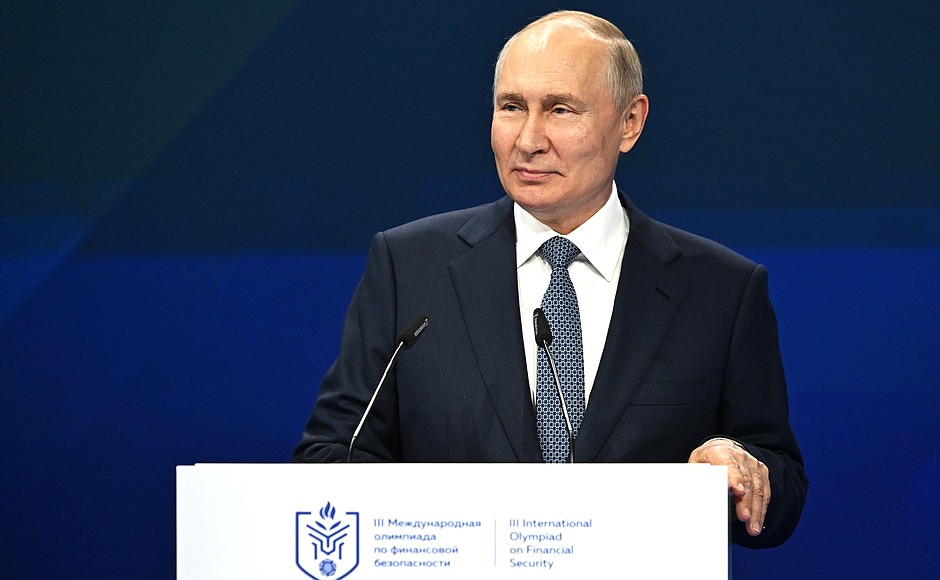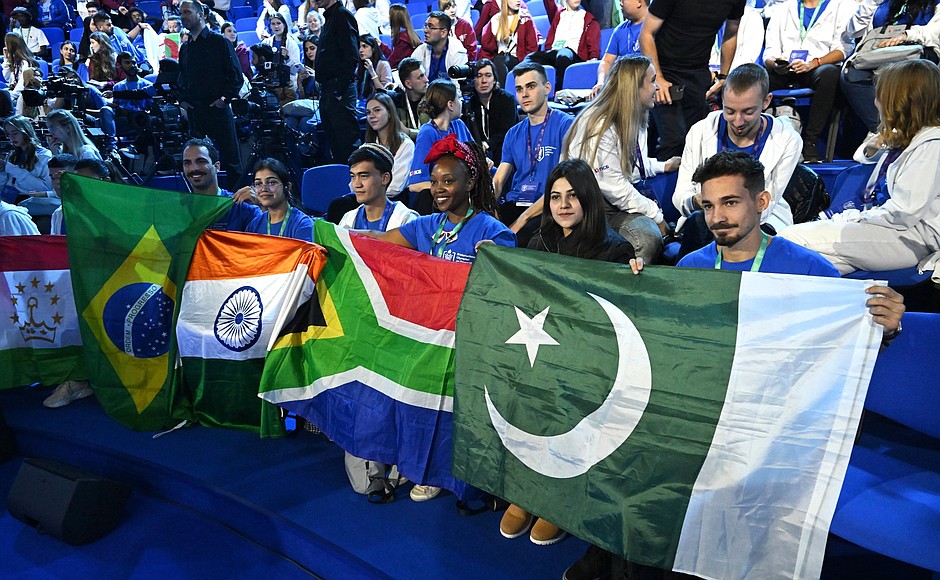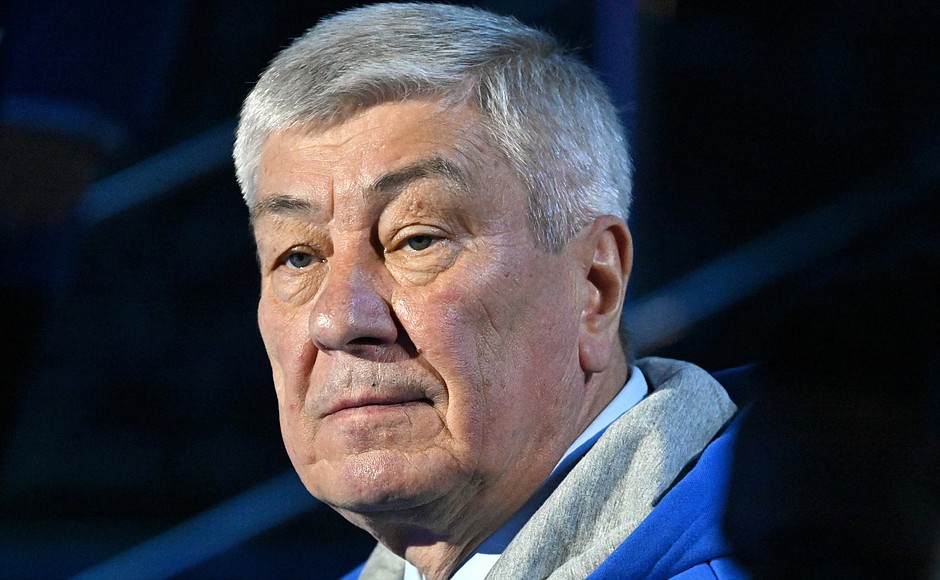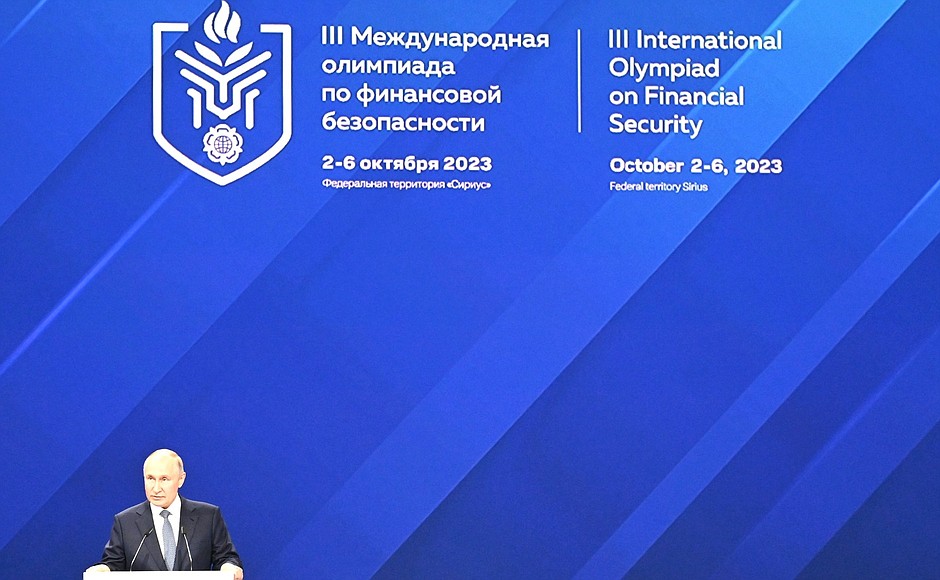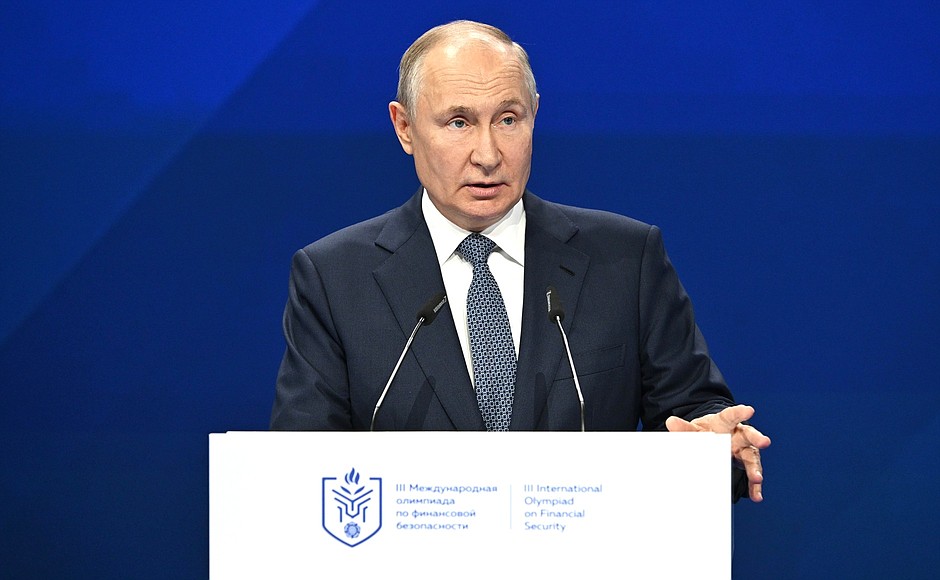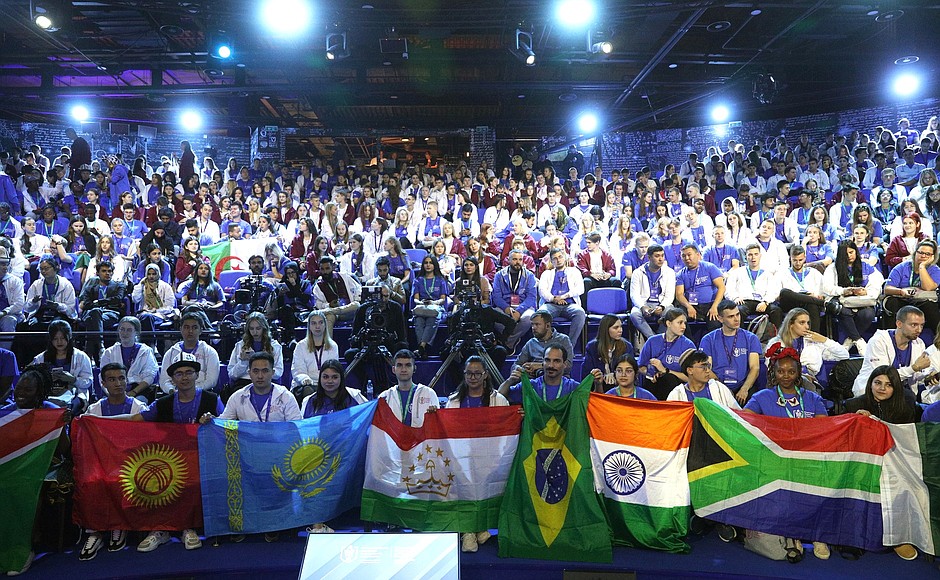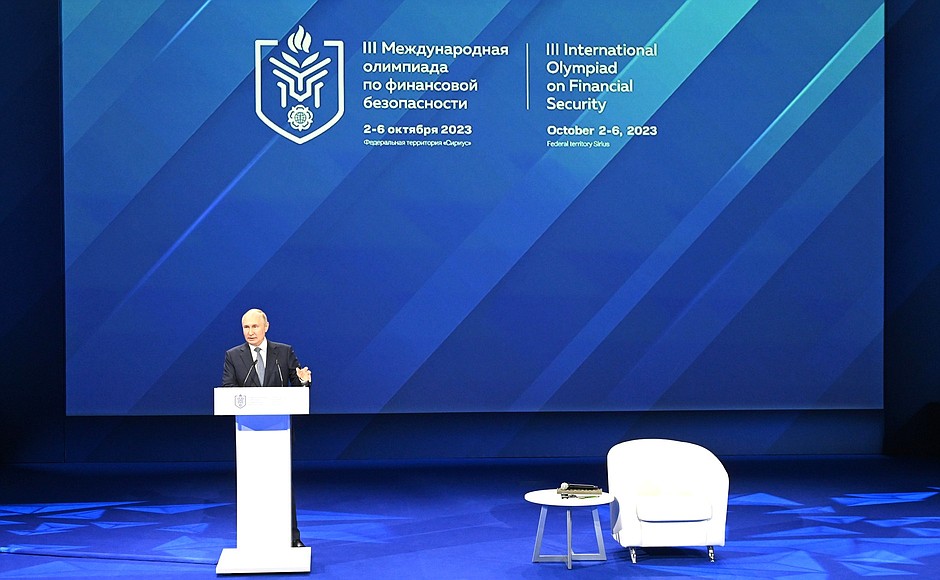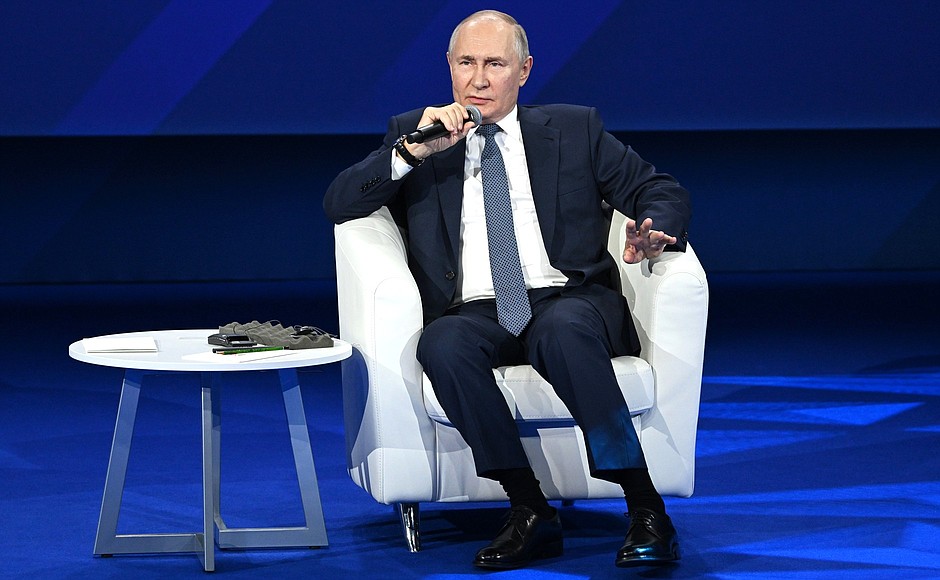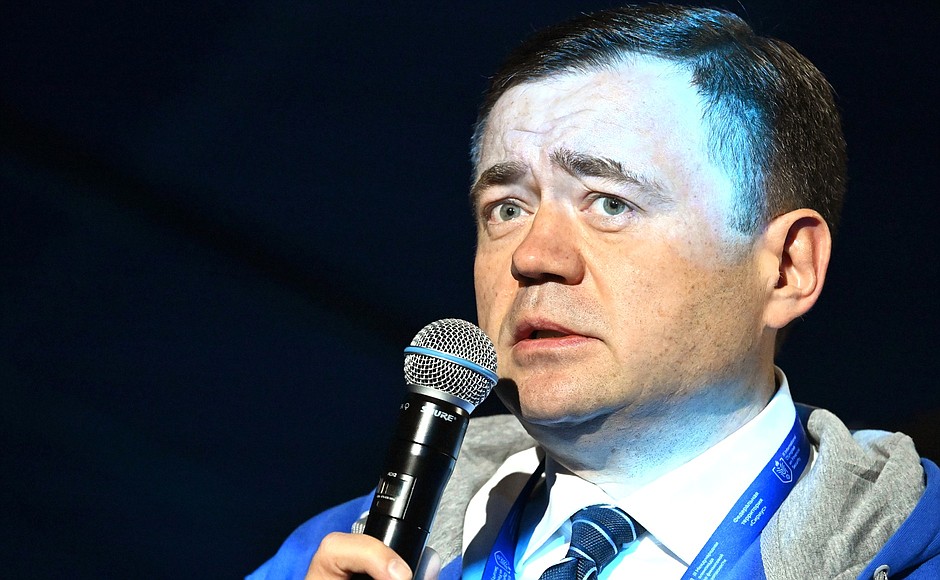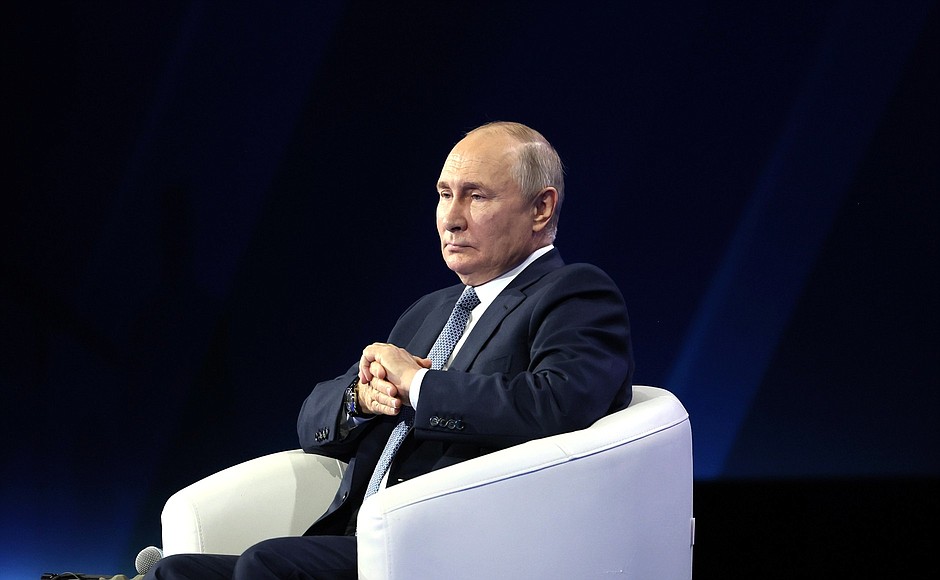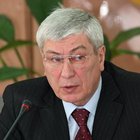The International Financial Security Olympiad has been held annually since 2021 at the initiative of Rosfinmonitoring agency. High school and university students participate in the competition; this year more than 500 students from 19 countries made it to the finals. In addition to individual tasks, the final stage programme included meetings with invited experts and potential employers, workshops, panel discussions, tours and sports.
* * *
President of Russia Vladimir Putin: Good afternoon, friends.
I am delighted to welcome you to the final stage of the International Olympiad on Financial Security. Everyone here is very young – and you are dealing with serious issues such as security, financial security.
These intellectual competitions are being held at Sirius for the third time and they bring together talented young people, school students and university students. Every year the geography of the participants is confidently expanding, I am very pleased – not only do contestants come from almost all regions of the Russian Federation, but also from other countries.
This practice of international communication, educational cooperation, and the establishment of friendly contacts and partnerships in such a significant and sensitive area is certainly extremely important, especially now, when ensuring financial security is becoming increasingly important every year. It is a very complex goal, a grand mission, without exaggeration, and it requires joint efforts and highly-trained specialists in various fields.
You are well aware that advanced solutions and technologies are rapidly developing in the financial sector, including digital currency, tokenised assets, new payment services and financial transaction models, including some based on blockchain technology – so-called distributed ledger technology.
I would like to say again that mutual trust and respect for your partner’s interests, for each other’s interests is extremely important in this area, especially when it comes to international economic cooperation. When we have this foundation and this basis, modern and essentially revolutionary technological solutions allow us to create a truly unique financial settlement system and even, if we take a broader look, an innovative infrastructure of global economic, trade, industrial and academic cooperation.
There are examples of such cooperation. In particular, a promising example is a joint project with several central banks in Asian and Middle Eastern countries for the issue and exchange of their digital currencies. More precisely, no other country has a chance of misapplication or of interfering with payment transactions, for example, by blocking a transaction, or blocking accounts or misappropriating other people’s money or assets. Regrettably, this is what sometimes happens in the modern world. There are very young people in the audience whom I can tell that this is what some arrogant adults do, adult people who obviously are not very smart if they take these wrongful actions, which ultimately hurt only themselves.
However, I am sure that you are aware of financial security issues and hence cannot only handle the competition’s complicated tasks but also offer your own bold and creative ideas that will be interesting for the professionals who have been working in this area for years and can be used to creating a new independent national and global financial architecture.
Incidentally, a session of the Valdai International Discussion Club will be held soon after our meeting. I believe you know about this platform even though many of you are very young and still school students. Last year, we used it to discuss promising forward-looking international financial platforms and future financial settlement systems, which will operate outside national jurisdictions and will therefore be more secure, safe and capable of avoiding the influence of certain global currencies, such as the US dollar, and hence unscrupulous foreign influence.
I would like to repeat that such mechanisms are being created and actively developed now. The volume of mutual transactions between states in national currencies is growing.
The world is gradually getting rid of the dictatorship of this financial and economic model, the goal of which is only to drive entire regions of the world into debt and bondage, turn them into economic colonies, and deprive them of resources for development.
I think you will agree with me that most people would not like a future like this. And therefore, the process of building a multipolar world order, which is more democratic, more honest, and fair for the majority of humanity, is simply inevitable and historically bound to happen. This fully applies to the creation of solid economic foundations for such a world order.
Moreover, modern technologies provide fundamentally new opportunities for individuals and businesses alike; they allow states to create and maintain public and financial institutions that reflect the new reality of a multipolar world, and develop more convenient and secure international payment systems.
At the same time, the spread of such technologies also poses a new kind of challenges for us as we need to prevent new threats. And this is a challenge, a practical task for all of us –for you and for anyone who is interested in this field.
In this regard, participation in the Olympiad movement certainly gives you a chance to acquire skills that are relevant today and will be needed tomorrow such as information protection and countering cybercrime, and in general, improving your level of financial and legal literacy.
Such experienced professionals – and I know we have them here, and that many of you will certainly become such professionals – such high-level specialists are needed at large state corporations, small high-tech companies and startups.
For our part, we will certainly provide comprehensive support, and will continue to develop the national education system based on Russia’s strategic interests and goals such as achieving technological sovereignty and leadership in key areas – a system of personnel training, in this case, mathematicians, engineers, and programmers. No artificial intelligence will ever be able to operate without them.
We will help your educators and mentors keep in step with you, improve their skills and, of course, share best practices and implement effective and cutting-edge curricula.
These truly advanced and unparalleled methods are being developed by the Sirius Educational Centre. Educators, mentors, leading scientists, and high-tech Russian companies are heavily involved in this important endeavour.
This includes, among other things, an innovative and experimental IT programme which will not only take high school students through a complete course of general studies, but will provide training in a sought-after IT specialty as well.
I have no doubt that these educational models need to be further improved, and we will by all means replicate and expand them.
Each of you has faced tough competition during the qualifying tests and proved your solid background, but you have also shown what you are made of, because winning any kind of competition without a strong character is impossible. This applies to traditional sports and competitions in general.
As you compete against worthy opponents, you perform unconventional tasks and test your knowledge in matters where economics, law, international relations, mathematics, and informatics meet. In addition, you can meet and talk as equals with experts in financial security, participate in panel discussions, and attend workshops.
I wish you well in successfully passing the final tests, in making a strong statement about yourself and your talent, as well as your professional capabilities. I have no doubt that this competitive atmosphere will not only make you stronger and more confident, but it will also help you excel during the final phase of these competitions and create good prospects for your future as professionals and as people.
I wish you success. Thank you.
Head of the Federal Service for Financial Monitoring Yury Chikhanchin: Mr President.
Thank you very much for taking the time to meet with the Olympiad participants.
A little over three years ago, during one of our meetings, we raised the issue of holding such an Olympiad, and you supported the idea. Today, in collaboration with the Ministry of Education, the International Educational and Methodological Centre, the federal territory of Sirius, and the Talent and Success Foundation, this project is underway with support from its industrial partners, such as Promsvyazbank.
Over the past three years, we have reached out to over 6 million school and university students who attended financial literacy classes and participated in various qualifying tests.
This is not the first time some of today's Olympiad participants came here in hopes of winning a prize, and some have already won it. But they enjoy it very much nonetheless.
During Olympiad week, more than 60 events will be held, including workshops that you mentioned and meetings with interesting people, and you are our keynote speaker today. We will also explore various games and approaches to problem solving. Sport competitions are also a key part of this.
Olympiad winners will continue the tradition of planting trees in Olympiad Alley.
The inter-Olympiad movement is alive. Several countries are now hosting Olympiads like ours. This is important. Representatives from several countries are here today to see how we go about our Olympiad and to join later. We have people from Saudi Arabia and Oman. These countries will join the Olympiad in the future, not to mention the fact that we have 19 countries here. This is important since we started out with just seven.
I would like to give the floor to one of the participants who is concerned about the issue you mentioned, financial security, and the ways to deal with it using the current mechanisms of interaction.
If I may, I will give the floor to Brazilian student Augusto.
Augusto Lemmertz: Good morning everyone. Good morning, Mr President Vladimir Putin.
My name is Augusto Lemmertz, and I’m the President of Brazilian Federal University of Rio de Janeiro. First, I would like to say that we have been warmly welcomed in your beautiful country and city, and I would like to stress the importance of every people from different countries being here, and the importance of the lecture given to us, too. Throughout the weeks we’ve been here, we were able to discuss financial crime, financial fraud and terrorism with specialists, with the best specialists you could present to us. We know too that this can evolve into international scenario and to solve this, this international scenario, we have… it is very important that we use our best ideas and our best tools for it in order to cooperate, as we face this common challenge, that is international crime. Transparency, a will to cooperate, and young minds are essential to our future. Thank you.
Vladimir Putin: As I understand, this is not a question but a proposal to transform this Olympiad into an international movement of sorts?
Augusto Lemmertz: Yes, yes, we will be very happy to be able to keep coming here like, as I said, we’ve met this beautiful country, this beautiful city, we have been more than warmly welcomed here, we feel home, as other students have said before, so we would like to really thank you all.
Vladimir Putin: You know, it is a good idea. We will definitely support everything related to this activity because it is relevant not only to our country, but the entire world. And given the complex processes that are underway in the world, building relations in a key area of interaction, on a wide basis – at the level of experts, is crucially important. So, I fully support your idea.
What is your name?
Augusto Lemmertz: It's Augusto.
Vladimir Putin: Let us assume that Augusto’s initiative is supported. (In Portuguese.) Muito obrigado.
Augusto Lemmertz (in Russian): Bolshoye spasibo.
Vladimir Putin: We will call it “Augusto’s initiative.”
Yury Chikhanchin: Good, thank you. I will take you up on it.
Mr President, during the Olympiad, we conducted several polls, including here in this hall. One of the questions was, what do you value the most in your life? It is amazing, but 91.8 percent of respondents said it was family. I doubt that in a European country the answer would be the same.
I wanted to say that we have formed an Olympic family over the past few days.
Now, I would like to give the floor to Ulyana from Russia. She wanted to speak about the Olympiad movement as a family.
Ulyana Kostyleva: Good afternoon.
My name is Ulyana, I represent the Russian People’s Friendship University.
I have taken part in this Olympiad several times. I am very happy and thankful for being here again because every year, the Olympiad brings more and more vibrant impressions and emotions.
It is very nice to see familiar faces among both the participants and the experts. Being a student and a participant, I want to say that it is very gratifying that the Olympiad includes so many intellectual events that bring together students from Russia and other countries where they can cooperate, discuss important issues and come to new conclusions. Everyone here can feel that they are not alone in their interest in this issue, and everyone feels part of this Olympiad movement, as you said.
In this regard, I have a small wish that this Olympiad movement will expand and become bigger. And I would also like to ask you to facilitate the organisation of more events for the finalists and participants, beyond the Olympiad week in Sochi. This would allow us to meet with each other throughout the year, maintain contact and gain new skills and knowledge on financial security.
Thank you.
Vladimir Putin: Thank you.
First of all, Yury Chikhanchin who organised and inspired this entire event has just noted in his remarks that family was unlikely to rank first among the values anywhere in European countries.
You know, first of all, I would like to come to the defence of our friends (we have many friends in Europe) because people claiming that traditional values, including family values, have died out are behaving very aggressively, especially in North America and Europe. However, quite a few people in European countries share our views. I would like to note that there are very many of them. They are simply behaving more quietly, and they are keeping it low. And so I do not want to divide anyone here, but rather I would try and consolidate everyone on our platform.
If such events as this one help achieve the goals that we are now discussing, then, of course, it would be appropriate to continue them over a long period, over 12 months, rather than in accordance with short deadlines, and we should prepare gradually for the event, the finals, that we are discussing today. Yes, you are probably right, we will do our best, we will speak with organisers, and we will ask them to support this idea. In turn, I will do everything possible to implement your proposals.
Yury Chikhanchin: Thank you very much, Mr President. If I may, a few words from the audience.
Vladimir Putin: Please do.
Yury Chikhanchin: Mr President, we have now discussed anti-crime efforts very actively because we are talking about financial security. The creation of common rules of the game is among our requirements.
Mr Kunal Gupta from India would like to set forth his position on how to address this issue.
Kunal Gupta: Good evening to everyone, to the President Putin.
I’m Kunal Gupta from India, and I’m representing Symbiosis Law School, Noida, Symbiosis International University. I believe that cyber crime is a global threat to the world. And now we should have a level playing field to work against this.
I believe that cyber criminals are working in a way that has become international crime. I believe that the landscape of cybercrime is such that it is not now restricted to hacking, phishing or ransomeware. It is expanded and has been including more and more techniques to scam and fraud people.
I believe that a lot of individual countries have pride to stop cyber crime, but they fear to do so, they are struggling to do so just because there is no cooperation between countries, and there is a limitation on the jurisdiction. For example, if a criminal from country A targets a victim from country B and then channelises the money to country C, there will be no such recourse that we can retrieve the money, and such crime is very difficult to resolve. So I believe that we should work together for international collaboration and we should make some global agreement and a global law to address cyber security and stop cyber crime. Thank you.
Vladimir Putin: Russia and India are bound by decades of friendship and cooperation, and, you know, what you have just said, coincides with the historical trend that our countries are now experiencing. This is because you and we voice quite similar or coinciding positions on this issue, too. When I say “we,” I mean Russia and India.
Several years ago, Russia had already submitted a proposal to the UN on establishing this international law system, and it also suggested signing an international treaty. Dozens of countries supported us. I very much hope that, despite all current difficulties on the international scene, we will eventually reach a certain consensus, and that we will not confine ourselves to the interests of countries heading this so-called financial pyramid and managing global currencies at their own discretion. To be frank, this is understandable because these are their national currencies. However, this does not meet the current interests of an overwhelming majority of humankind.
When these cybercrimes penetrate all spheres of activity and all countries, regardless of anyone’s positions in the global financial system, then, of course, it is very important to chart common approaches despite all disagreements facing humankind today because this amounts to common threats. You are absolutely right here.
We will try and implement all this. Of course, we are also counting on the support of your country’s government. We maintain a very benevolent personal relationship with Prime Minister Modi. He is a very wise person, and India is developing very effectively under his guidance. The implementation of such plans completely meets the interests of India and Russia. We will work, and we will certainly achieve the desired results.
Thank you.
Yury Chikhanchin: Thank you, Mr President.
The roads that led everyone to the Olympiad are different. But to unite all participants – we discussed this topic, and you gave a special instruction – we have created a special information platform, Sodruzhestvo (the Commonwealth). It was developed by Promsvyazbank and the International Network Institute, which includes Russia’s leading universities: National Research Nuclear University MEPhI, Plekhanov Russian University of Economics, Financial University, and foreign universities. Many young people have already registered on the platform. They interact there, learn and work.
But now I would like to give the floor to a representative of Pakistan, Aeman, and she will tell us about her road to the Olympiad.
Aeman Masood: Hello and privet. Thank you so much for taking your time and coming here. My name is Aeman Masood, and I am representing Pakistan.
My experience over here at this Olympiad has been incredible. It is a once-in-a-lifetime opportunity and many people do not get it. I am really honoured to be here.
This Olympiad is nothing less than extraordinary and it is amazing. When I first heard about this Olympiad, I was really excited about it because of its emphasis on financial inclusion and, since my country, which is Pakistan, was grey listed from the FATF, I wanted to know and have more insights about these matters and here I am.
It is really nice to see all of you working hard and making sure that people from different ethnic backgrounds and even people with financial limitations can be over here and participate. This exposure has actually allowed me to increase my global connections.
So, thank you on behalf of Pakistan for giving us this opportunity. Spasibo, Russia. That’s it.
Vladimir Putin: It is very nice to hear. As I said already in my opening remarks, participants are coming from more and more different countries. If you find something of use to you here, then our goal has been achieved.
I wish you all the best.
Thank you.
Yury Chikhanchin: Thank you very much.
Mr President, can we take more questions?
Vladimir Putin: There is a young man who is holding up his hand, and that will be it, I think.
Yury Chikhanchin: All right.
Dmitry Burenok: Good afternoon, Mr President.
My name is Dmitry, my field is information security. I study at the National Research University of Electronic Technology in Zelenograd, Moscow.
As an information security specialist, I would like to say thank you. In 2022, you signed Executive Order No 250, which ensured the information security of our country and provided for creating an environment for information security specialists where they can utilise their professional skills and take jobs to protect our citizens. I want to thank you for that.
I have a dream that I want to tell you about. Our rector has recently turned 65 years; he received a birthday message from you. On behalf of all the students of our university, I want to invite you to visit us. Our university is famous for what it developed in the defence industry and microelectronics, which has applications in civilian infrastructure. There are many projects, including the development of artificial human organs and many other ambitious projects. If you decide to come, we will be happy to show you around.
Vladimir Putin: Thank you, I will try. I wish you and your respectable university success. Thank you.
Yury Chikhanchin: Everyone, let us thank President Vladimir Putin for his visit and the discussion. I think this was the most important conversation in your lives about things that matter the most. Please cherish and keep this memory, and I wish you every success. Let us wish success to our President.
Vladimir Putin: Thank you very much.
It was already said in the beginning: you have determined where your priorities are on the scale of values, and this is the most important thing,
I wish you success and all the best.
